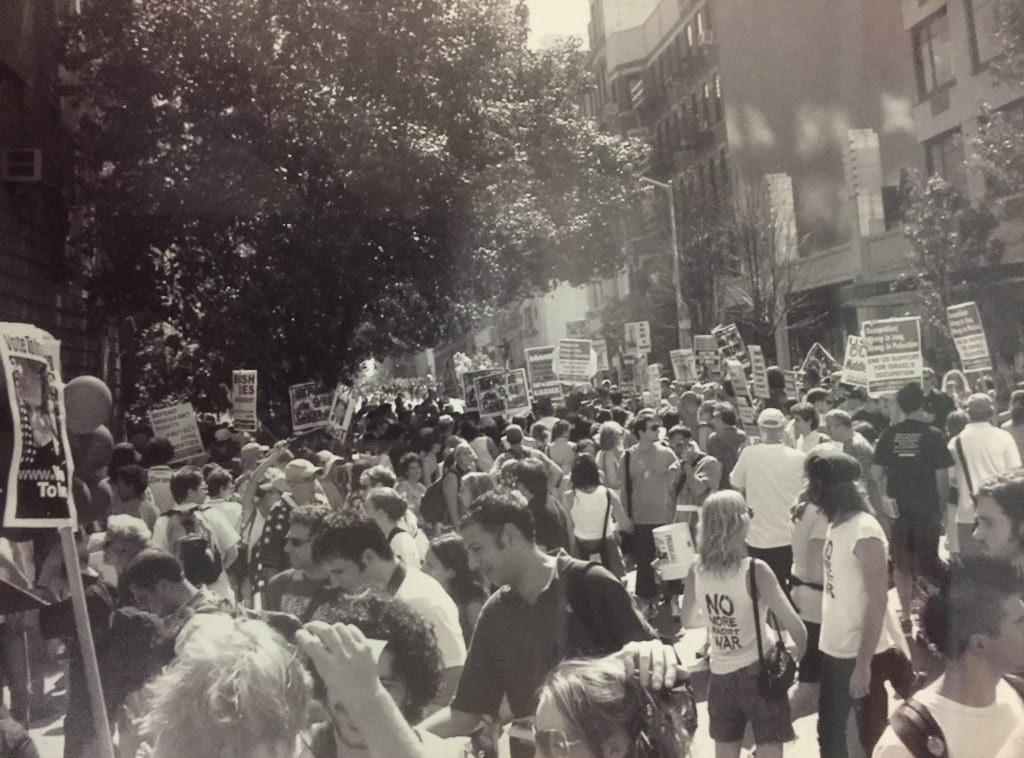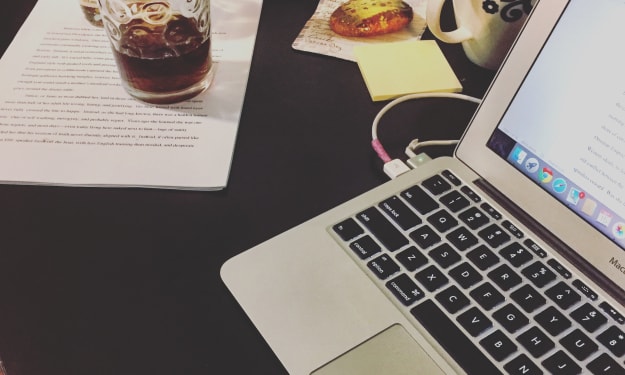Voices of Dissent
Protestors, reasons, and frontline views.

I stood in the cold in February 2003 and voiced my mind against an ensuing war. The NYPD pushed us into barricades, to let the horses come through, and then they released us into horse manure-covered streets. My friends and I reveled in the glory of it.
In March of 2003 I lied down in DC for a die-in. My Dad, in town for a meeting, told his friends his daughter was out protesting the war. I was there for research that weekend. There were die-ins and chalk lines drawn, I got lucky that weekend. Even luckier, since I was protesting without friends of my own in the crowd. I downed Jack and Cokes all night as I listened to the stories of "my finger was on the nuke button" from the largely conservative and Republican colleagues of my father’s.
The RNC Protest of 2004 took me from Chelsea to Madison Square Gardens. It was hot that day. My halter top was even too hot in the blazing summer sun. Booing, and feeling the sounds of thousands, was something to not forget. As the sun melted my pores, and my shoes lost heels on the pavement, the exuberance of the crowd, the commonality among strangers, and the power of community encouraged me, buoyed me, and comforted my young soul. In my late twenties my eyes still had more rose colored filters left to be tweaked. Yet, I was no stranger to this rally crowd. In college I stood up and demanded the renaming of college dances as names like “Old South Ball” demarked a legacy of tradition for when people were chattel, and while editor of the campus paper the front page covered the student protest about not honoring or acknowledging Martin Luther King, Jr. Day on the college calendar. These latter two were small steps in the larger framework of a multifaceted journey.
On Saturday 25 September 2011 I went to voice my discontent that corporations rank higher than education. That individuals who made horrible choices on homes have been bailed out. That a bi-partisan government has halted my future. Traveling the masses alone--not something I recommend--encountered me with the NYPD. At no fault of my own, I stumbled and paused on the exterior of the crowd near the timing of the incoming wave of police. Perhaps it was a change of shift. I paused . . . as my knee throbbed and I banged it on an edge of railing . . . A cop told me I needed to keep it moving as he stepped toward me and put his hand on my shoulder to push me back.
I was lucky to not end up in the tombs. Eighty protestors were arrested in that first weekend . . . and days later infamous scenes of encouraging protestors to cross the Brooklyn Bridge to then arrest them infiltrated the media. Yet, what does any of this mean? Those days of Occupy Wall Street seem like a lifetime ago, yet . . .
Then and now protestors stand up for a variety of reasons. Some are seeking a utopian world. Some are looking for their voices to be heard. Some, in an odd type of form, are merely tourists of the activity. Yet, a singular point remains. We protest for a fair and just system. We protest from anger and confusion that banks and corporations are not being held accountable in the same way average Americans are. The constant knowledge that corporations are receiving continual tax breaks, to the point of not paying any taxes, that are wages are unlivable, our healthcare unaffordable, and that in moves to a contingent labor force we have seen the quality, comfort, and makings of life become unobtainable to the many. The middle class is declining. Progress, equality, and safety have become threatened as legislation is being repealed and campaigns resting on demarcation are infiltration our media houses.
Our schools are devoid of funds to open their doors, our public transportation systems are slowing as operational funds are depleted yet rates to ride increase, our roads are filled with potholes, and our bridges remain in disrepair. Yet, banks do not have to resort to bake sales and reducing working days to four to stretch shrinking budgets. A fellow protestor captured the sentiment well—during Occupy—with his sign, “Bake sales for banks and bailouts for schools.” We want a country, and a world, that allows us to be performing members of society. We want a nation that honors our work, dedication, intellect, and critical thought.
We are a conglomeration of people, coming from every demographic and subset. Certainly, jobs and healthcare are more than personal; they are also universal. Instead, this collective protest without one organization taking its central core represents the layers of American society. Now, six years after Occupy we find ourselves waking up in another protest. This time . . . this time we are facing defunding of women’s health, climate protections, bank regulation legislation, and the list goes on.
We woke up to find ourselves with a turning point of democracy, and we found the knowledge that progress can stop and be undone if do not stand up and continue the fight. Racial injustices were forced to change on account of grassroots voices, actions, and walk-outs. Allowing woman and minorities into higher education, jobs, and so forth happened because of our collective voices. Thus, we are the so-called cultural elite with PhDs adjuncting at several schools to make ends meet, we are PhDs with tenure, we are construction workers, laid-off workers, unemployed teachers, writers, poets, painters, bankers, CEOs, preachers, college graduates, college drop-outs, the poor, the wealthy, those with no college ambition, and the tangible forces that make a society function. Some hold steady jobs, some are struggling in a fledgling economy, some have led lives of wealth and privilege never knowing a work day or of going without. In the end, we are more than the 99 percent of Americans below the wealth threshold. We are looking for a future that honors us, respects us, holds all to the same standards and laws, and gleams of the change we have been promised.
The Arab Spring was celebrated throughout the world; yet, when the United States began to leave their front porches and living rooms to walk the streets in contempt attempts to silence this growing contingent have arisen. The police have grown more violent in their attempts to quarantine and rebuff us, making the larger contingent out to be radicals without a purpose. That we are not. Protests, a first amendment right, has been dubbed as acts by professionals. We are not professional protestors. Instead, we are individuals, communities, and living souls with causes, concerns, and desires to see growth and progress.
In the end, we want to be heard. We want to be seen. We want to show that we are not just looking for a spectacle. We want a viable country with jobs, healthcare, housing, and a functioning financial system so that we have a nation to provide for (as it to us). For folks like me, and the masses with me, if we allow complacency then we stand to lose what we have gained. If we do not teach, act, and encourage progress then . . . then, the pages of history will unturn, the clocks will reverse, and generations and legions of fighters, teachers, and individuals crafting spaces and meanings of life will have worked for naught. That, that is why I continue to advocate, fight, and stand my ground in the face of uncertainty, failure, and fear.
About the Creator
Annessa Babic
Annessa Babic is a bit of a gypsy having lived from coast to coast and travelled around the globe. She's a freelance writer, photographer, and professor. She's written scores of pieces on topics from travel to the changes of life itself.






Comments
There are no comments for this story
Be the first to respond and start the conversation.